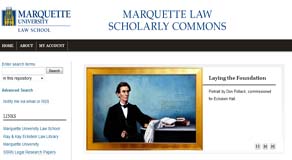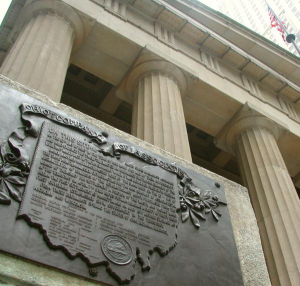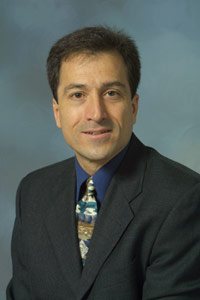Marquette Law School Launches Institutional Repository
 The Eckstein Law Library is pleased to announce the formal launch of the Marquette Law Scholarly Commons, which offers free, online access to a growing collection of scholarly work of the Marquette University Law School community. Today, the Scholarly Commons has over 5300 items, including all four student-edited, Marquette law journals as well as articles written by Marquette University Law School faculty published in the Marquette law journals and elsewhere. In the future, look for additional journal articles to be added to these existing collections and for new collections to be announced. Although the full-text documents in the journal and faculty scholarship collections are the heart of the Scholarly Commons, the repository also serves as a gateway to other endeavors of the Law School community. Follow links to read the Faculty Blog or the Marquette Lawyer, learn about programs such as On the Issues with Mike Gousha, and explore faculty working papers and accepted articles in Marquette’s Legal Studies Research Paper Series on SSRN.
The Eckstein Law Library is pleased to announce the formal launch of the Marquette Law Scholarly Commons, which offers free, online access to a growing collection of scholarly work of the Marquette University Law School community. Today, the Scholarly Commons has over 5300 items, including all four student-edited, Marquette law journals as well as articles written by Marquette University Law School faculty published in the Marquette law journals and elsewhere. In the future, look for additional journal articles to be added to these existing collections and for new collections to be announced. Although the full-text documents in the journal and faculty scholarship collections are the heart of the Scholarly Commons, the repository also serves as a gateway to other endeavors of the Law School community. Follow links to read the Faculty Blog or the Marquette Lawyer, learn about programs such as On the Issues with Mike Gousha, and explore faculty working papers and accepted articles in Marquette’s Legal Studies Research Paper Series on SSRN.
This repository grew from a shared vision of Dean Kearney, the Law Librarians, Associate Dean for Research Michael O’Hear and others to provide convenient and global access to the scholarly output of the Marquette University Law School. While preserving the scholarly output of the Law School, the Marquette Law Scholarly Commons also expands the reach of faculty scholarship and Law School journals. Indeed, in the past few weeks the repository had visitors from Australia, Japan, India, Brazil and China, among others.
We encourage you to be a regular visitor to the Marquette Law Scholarly Commons. If interested, you can monitor new items as they are uploaded to the Scholarly Commons by enabling the Marquette Law Scholarly Commons RSS feed in an RSS Reader or setting up personalized email notifications to be sent when content that meets specified search criteria is added. The Marquette Law Scholarly Commons is a service of the Eckstein Law Library.


